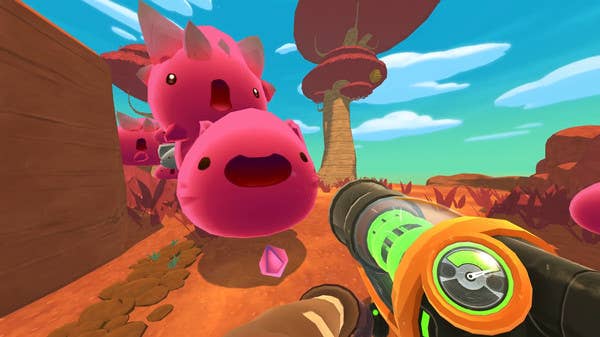How to prepare for unexpected success
Having a Slime Rancher pre-alpha find its way onto YouTubers' radar wasn't part of the plan, but Monomi Park was ready to take advantage
Monomi Park's first game, Slime Rancher, isn't technically out yet but it's already a hit. Since debuting on Steam Early Access in mid-January, the pastel-colored first-person management sim has sold more than 100,000 copies. But when asked about how the tiny developer engineered such a successful debut, co-founder and designer Nick Popovich described a situation that was at least as serendipitous as it was strategic.
"We wanted to get on early access as early as possible in 2016, and around Christmas time we were preparing a build we felt very good about, and we were going to put it in front of people," Popovich said. "So we put it in front of friends and family and also invited some outsiders that had been following me on Twitter, and people that we knew from other jobs to check it out. Somehow it kinda got out, and pretty soon we had a number of YouTubers reaching out to us."
For developers struggling to gain attention for their games, that part about "somehow it kinda got out" might be frustratingly glossing over a pretty key point, as could be Popovich's admission that he didn't actually reach out to anyone for coverage. But that's not to say the small team at Monomi Park didn't work for their break; they just worked in less direct ways.
"[I]t's pretty important to understand that is the new advertising for games, streaming and YouTube and people informing one another through the channels they enjoy."
For one, the game was designed to be very YouTube friendly. The action in the game is consciously oriented toward the camera, with actors deliberately designed to face the player during interactions, and there's an unpredictability to the gameplay that ensures different people will see different things happen on various playthroughs.
Secondly, Popovich said that once the game started to get noticed by YouTubers, they reacted quickly to it and sped up their plans to distribute Steam keys. He's seen some developers resistant to the idea of doling out free copies of the game to smaller YouTube personalities, but Popovich said there can be a good return even on those.
"I think it's pretty important to understand that is the new advertising for games, streaming and YouTube and people informing one another through the channels they enjoy," Popovich said. "Once you have Steam keys, you don't want to just give them away to anyone who has 50 subscribers, but you want that to spread, because it's worth it. If just one person buys it out of the entire lot who saw that YouTube video, it's worth it. Because you broke even in terms of that sale, and now you've got however many thousand people who are aware of your game."

As a result of all this, essentially nothing with the game's marketing and promotion has gone according to plan. Popovich and Monomi Park co-founder Mike Thomas had been warned that the Steam Greenlight process can take a couple months, so they built that time into their schedule. When it garnered approval from the community in a matter of days, they moved up their plans to debut the game on Early Access. They had also expected their Early Access experience to be them interacting with a limited community providing feedback over time, but the game's momentum has been growing and the size and voice of the community is already nearly overwhelming.
"We just weren't anticipating the response, and now it very much feels like we're working on a live game."
"The ironic twist to all of it is we chose a single-player 'boxed' game, if you will, instead of a persistent online game thinking, 'Well, we won't be chained to this game and having to update it aggressively and everything.' We just weren't anticipating the response, and now it very much feels like we're working on a live game," Popovich said.
That comparison is coming from first-hand experience. For most of his eight-year run at Sega subsidiary Three Rings Design, Popovich was lead designer on the free-to-play online action-RPG Spiral Knights. With the crush of customers in Slime Rancher's Early Access pool now, Popovich is finding his past work history surprisingly relevant. For example, while he hears and understands the chorus of feedback asking for more content ASAP, Popovich said he's tried to be forthcoming about how long meaningful updates to the game will take. He's even encouraged players to take a break from Slime Rancher and check out some other games.
"There's a really great philosophy in the MMO space, 'Let people quit your game.' Let them happily walk away from your game, reach some point of closure and then they'll come back when you release more content," Popovich said. "And I think that's still true for non-MMOs that are going to update over time. We hope people aren't just clicking refresh, because they're going to get burned out. The game's just not built for that."
Even though the Spiral Knights team topped out at seven people, Popovich said aspects of the game were still too grand for his liking. From the start, Popovich wanted Slime Rancher to be smaller in scope.
"Working on this I can keep the focus extremely narrow, as much as I'm able to, in order to execute on it," Popovich said. "I like to think of Slime Rancher as a shark. Every part on it informs the shark itself. There's nothing superfluous on there. You can't take any one bit off a shark and have it still function, so I was looking at it that way. If this thing was going to survive, it needed to be a shark. It was a lot cuter than a shark in the end, but that was my thinking going into it."
"If this thing was going to survive, it needed to be a shark. It was a lot cuter than a shark in the end, but that was my thinking going into it."
That attitude could go a long way toward explaining Slime Rancher's success. The pre-alpha version of the game that first got traction on YouTube had a shark-like completeness to it, so even though it was never intended to get out in the wild, it was prepared to impress when it found its way out regardless.
"I think early on you can't really think of your game as being all that special because there's a lot of noise out there," Popovich said. "You have to get your game, if you want people to see it early on, into a state that is whole on its own. Our little pre-alpha was a complete experience in some ways. It ended in an open fashion, but it had a beginning and it didn't feel like parts were left out. And we just gave it away. We gave it to whoever asked for it, and I think that's important."
Popovich insisted on that shark-like completeness right from the start. When he first left Three Rings to go indie, his plan was to make a prototype that he could then use to recruit a partner. He didn't know how to code, but he muddled through the process with an assist from off-the-shelf Unity Store assets. (In place of the game's super-cute vacpack tool, Popovich said the original Slime Rancher prototype had "beefy soldier hands holding a pistol.") He knew he had to get the core fun loop of the game down before he could convince others this would be a project worth their time.
"As a designer, especially as a project lead, you get used to waving your hands and saying, 'It's going to be like this and it's going to be amazing!' You're trying to sell people on this idea, and I think that's a lot easier to do when you're all collecting a paycheck from the same place," Popovich said. "You have a security net, and if it doesn't work out, something else will. But it's a totally different story when someone is leaving their job and you're trying to make what you're doing into their next thing.
"It would be misleading to build a prototype and say, 'It might not feel right but when the crafting system is there and the job system and all this other stuff, it will be a really fun game.'"
"I knew I had to prove it outright. It would be misleading to build a prototype and say, 'It might not feel right but when the crafting system is there and the job system and all this other stuff, it will be a really fun game.' I think that's incredibly misleading. You have to sell it for what it's going to be in the moment-to-moment."
Popovich had heard his former Three Rings co-worker Thomas was looking to make a transition, so he shared the prototype with the software engineer. It convinced Thomas to give working together a shot, and after a weekend trial, the pair officially formed Monomi Park. Now that Slime Rancher is already a success in Early Access, the option for growth is there, but Popovich is taking the same streamlined shark approach to staffing up as he took to the game.
"At Three Rings, I saw my old boss Daniel [James] build a successful company by doing it very slowly," Popovich said. "So Mike and I intend to do the same thing. We're not going to be staffing up a bunch of people. I really can't see beyond a few more people to be honest, just from my experience on Spiral Knights. We've sold well over 100,000 copies at this point, so we're doing all right, and it's really a question of where we want to take this."









